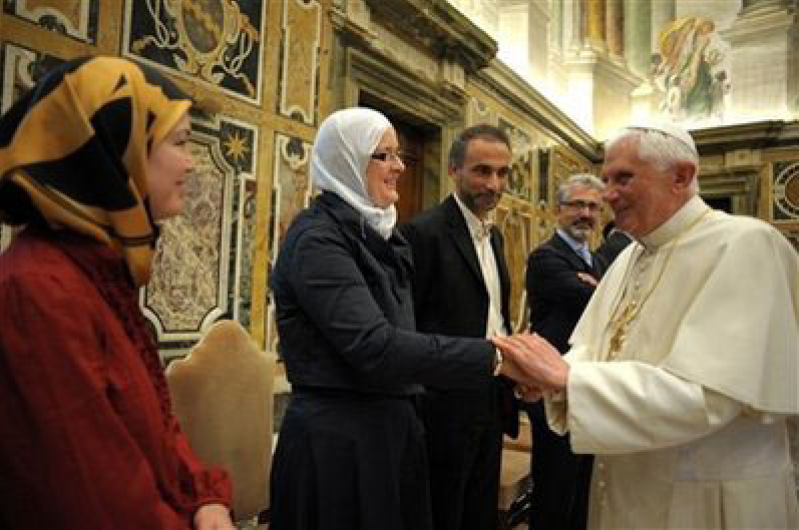
With so many new interfaith dialogues between different sets of Christian and Muslim leaders, there is a possibility for overlap and confusion, according to the Vatican's top official for interfaith efforts.
There is now so much interest in Christian-Muslim dialogue that it is getting hard to see where it is going, said Cardinal Jean-Louis Tauran, head of the Pontifical Council for Interreligious Dialogue, in an interview after last week's landmark conference between Catholic and Muslim leaders.
"There's a risk of overlapping," he told Reuters. "It may be the price to pay for all this interest that interreligious dialogue incites."
While dialogue between Christians and Muslims is nothing new, since the Sept. 11 attacks, sharpening tensions between western and Muslim states have given it a new urgency.
Two years ago, Catholic-Muslim relations especially soured after Pope Benedict XVI delivered a speech in Regensburg, Germany, in which he quoted a 14th century Byzantine emperor's criticism of Islam, linking it to violence.
One year earlier, violent protest broke out in Muslim countries after a Danish newspaper printed a series of cartoons of Islam’s most revered prophet, Mohammad. Over 50 people died in the ensuing deadly clashes, which some say could have been averted had Christians and Muslims jointly denounced the violence.
At last week's closed-door talks, a team of Muslim scholars met with the pope and Vatican officials to develop ways to help defuse ongoing tensions between Islam and Christianity.
"Dear friends, let us unite our efforts, animated by good will, in order to overcome all misunderstanding and disagreements," Benedict said in a speech to the delegates. "Let us resolve to overcome past prejudices and to correct the often distorted images of the other, which even today can create difficulties in our relations."
Led by Mustafa Ceric, the Grand Mufti of Bosnia-Herzegovina, the 24 Muslim scholars attending last week's Nov. 4-6 gathering represented the Common Word Group, a broad coalition of Muslim leaders and scholars who are pursuing dialogue between the world's two largest religions.
Since the group issued The Common Word Manifesto last October, a total 275 prominent Muslims have signed the document urging Christian churches to reach mutual understanding to safeguard global security, based on shared principles of loving God and their neighbors.
Common Word delegates have also met this year with a number of Protestant leaders, proposing regular dialogue sessions, student exchanges, suggested reading lists and other ideas to help Christians and Muslims learn more about each other.
At another more recent Muslim-Christian conference, hosted by the Archbishop of Canterbury, 17 prominent Muslims met with 19 Christian leaders and denounced the persecution of Iraqi Christians, saying that there was no justification in Islam for the attacks.
During their Oct. 12-15 meeting, participants addressed issues such as the global economic crisis, interfaith education, different understandings of scriptures, shared moral values, respect for foundational figures in the respective faiths, religious freedom, and the persecution of minorities in Iraq.
Prior to that, a four-day meeting was held late July at Yale University, where high-profile leaders discussed how Christians and Muslims might work together to address world poverty, the wars in Iraq and Afghanistan, the situation in Palestine and Israel, the dangers of further wars, and the freedom of religion.
At the conclusion of the meeting, over 140 conference participants – including the Rev. Geoff Tunnicliffe, international director of the World Evangelical Alliance – unanimously approved a cooperative statement that signaled a new beginning of collaboration between Christians and Muslims where stronger assertions of faith would be not just be allowed but required.
In his recent interview with Reuters, Vatican official Tauran expressed his concern over the confusion that could arise from the high number of such Christian-Muslim dialogues.
"In my opinion, there are too many Christian-Muslim initiatives. Everybody's doing it," he said. "One doesn't know where this will go. That proves there is a great interest, but it sows a bit of confusion.
When asked if Christian churches could coordinate their efforts, Tauran shook his head and said, "It's like in Islam. There is no single voice. For the moment, it's not possible."
Currently, Catholicism ties together the largest number of Christians in the world with 1.2 billion members. Protestants, meanwhile, reportedly comprise some 700 million believers – ranging from a number of denominations. In addition, around 260 million believers ascribe to Eastern Orthodoxy and 81 million to Oriental Orthodoxy. Anglicanism rounds out the list of largest Christian denominations with 77 million members.





![[Exclusive Interview] A revelation within the brink of life and death — Meg Leung’s mission in Christian art](https://www.gospelherald.com/media/cache/thumbnail/7/21/72163sp_273w_150h_1x_1y.jpg)

